
views
- Connect with a recruiter and send them a message at the same time.
- Introduce yourself, then briefly list your qualifications and what industry you’re in.
- Keep your message short, and check it for spelling and grammar errors before you hit send.
- Avoid spamming a recruiter with messages, but feel free to follow up after a few days if you don’t get a response.
Is it okay to message a recruiter on LinkedIn?

Yes, it’s professionally acceptable to reach out to a recruiter on LinkedIn. While it might seem a little strange at first, LinkedIn is, at its core, a social network. This means that while you might not know the recruiter personally, it’s totally fine to send them a quick hello and ask them to connect. Recruiters will often reach out to potential candidates via LinkedIn, even if they don’t know them personally. Think of it as saving the recruiter a step—instead of them finding you, you’re finding them. While messaging a recruiter once is fine, avoid sending them multiple messages in a row. Recruiters are busy people, just like you, and they probably have tons of messages to reply to.
How to Contact a Recruiter
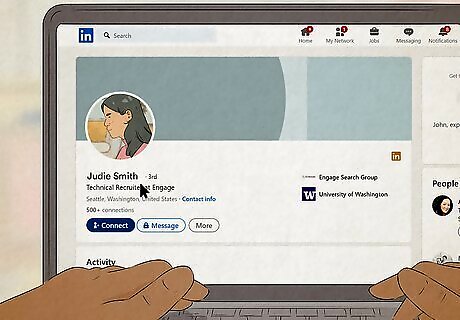
Find the recruiter using LinkedIn search. Most recruiters on LinkedIn will advertise that they’re a recruiter, either in their job title or in their summary paragraph. You can use LinkedIn search to search through “recruiters,” or you can specify which industry you’re looking for and find recruiters that way. Before connecting with a recruiter, check out their profile and work history to see if they’re a good match for you. If you’re in their industry or they note jobs that they’re currently recruiting for, you can wean out people who aren’t a good match.
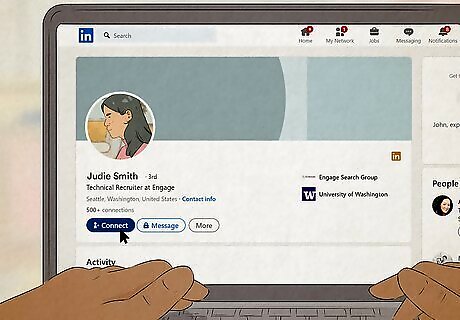
Click “Connect.” In order to send a recruiter a message, you first need to connect with them. Once you find someone you want to message, hit “Connect” to start typing.
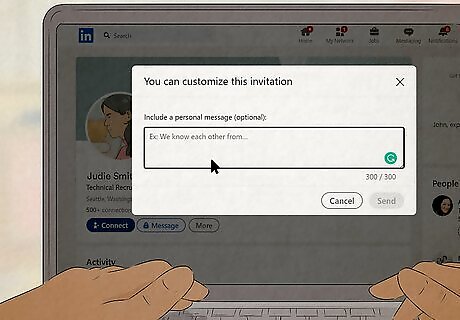
Send a message with your connection request. Once you hit “Connect,” a message box will pop up where you can type out your message. This message will not only go to their LinkedIn inbox, but it will be emailed to them as well.

Follow them on other social platforms. For a better chance of getting a reply back, find the recruiter on Twitter, Facebook, or Instagram. Follow them on these platforms, but don’t send another message just yet, since that could feel overwhelming.
Best Practices
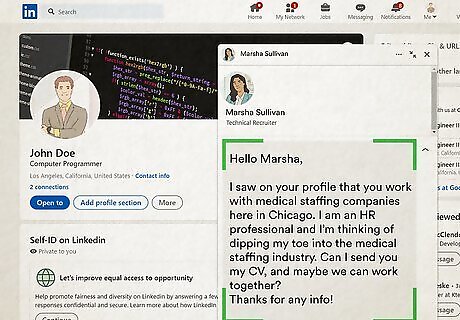
Keep your message short and snappy. Recruiters get lots of messages every day, so it’s important to be brief. Stick to 3 to 4 sentences when you send your message so they can quickly skim it. Try to avoid asking questions, too. If a recruiter feels like they have to do a ton of heavy-lifting before they respond, they might not send a message back. Under 100 words is the maximum, but 50 to 75 words is ideal.
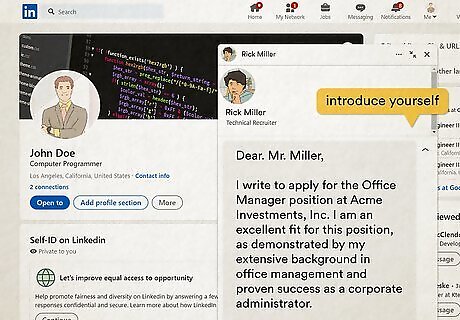
Introduce yourself and list some of your qualifications. In your message, start with the most relevant information: who you are and what kind of job you’re looking for. This will tell the recruiter whether you might be a good fit for any potential job listings they have.
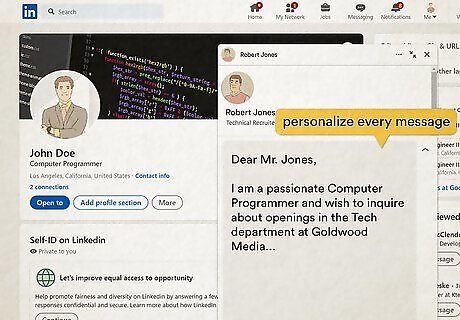
Personalize every message you send. If your message sounds like it could be mass-emailed to thousands of people, then it’s probably not specific enough. Be sure to modify your message to each recruiter that you reach out to so it sounds personal and like a human wrote it. This is another reason why it’s important to check out the recruiter’s LinkedIn before sending a message. If you accidentally call them the wrong name or reference the wrong industry, they’re unlikely to respond to you.
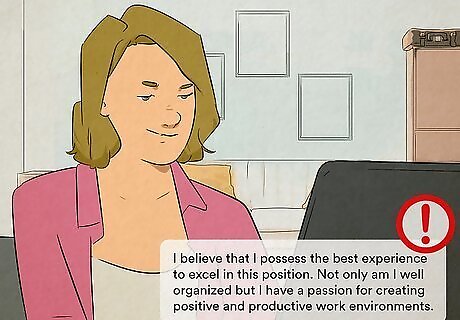
Avoid bragging about yourself too much. It’s one thing to list your qualifications and experience, but it’s another to go off on a tangent about why you’re the perfect employee that the recruiter has been looking for. Keep your message brief, and only insert a few key facts about yourself—if they want to know more, they’ll either reply back or check out your profile.

Scan your message for typos before sending. In the professional world, it’s not a good look to include any mistakes in a message, especially to someone who could help you get a job. Before hitting send, do a once-over to make sure that your spelling is tiptop and your grammar is up to snuff.

Asking the recruiter to list all the available jobs they have. It might be your first instinct to ask a recruiter for more info, but that’s unlikely to get a reply. Instead of inquiring about what they can do for you, tell them what you might be able to do for them. Typically, recruiters get paid based on how many positions they fill. If they feel like you’re a good fit for a job, they will do whatever they can to get you into that role.
Example Messages
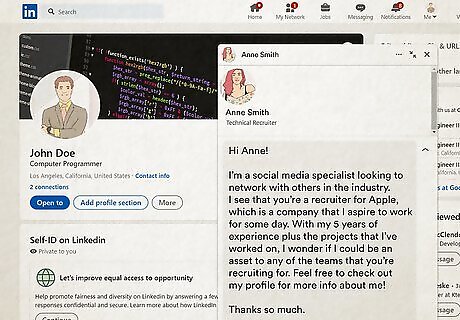
“Hi Anne! I’m a social media specialist looking to network with others in the industry. I see that you’re a recruiter for Apple, which is a company that I aspire to work for some day. With my 5 years of experience plus the projects that I’ve worked on, I wonder if I could be an asset to any of the teams that you’re recruiting for. Feel free to check out my profile for more info about me! Thanks so much.”
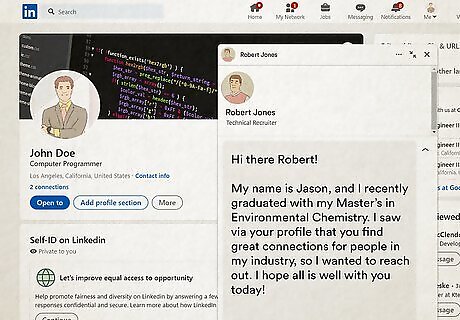
“Hi there Robert! My name is Jason, and I recently graduated with my Master’s in Environmental Chemistry. I saw via your profile that you find great connections for people in my industry, so I wanted to reach out. I hope all is well with you today!”
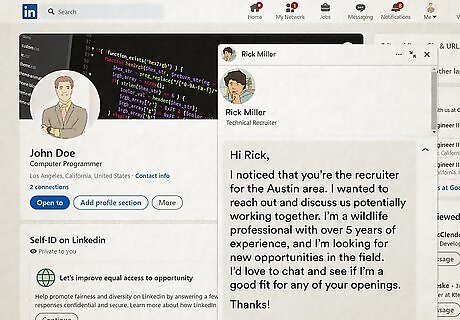
“Hi Rick, I noticed that you’re the recruiter for the Austin area. I wanted to reach out and discuss us potentially working together. I’m a wildlife professional with over 5 years of experience, and I’m looking for new opportunities in the field. I’d love to chat and see if I’m a good fit for any of your openings. Thanks!”
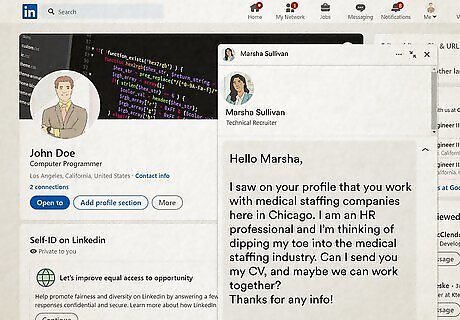
“Hello Marsha, I saw on your profile that you work with medical staffing companies here in Chicago. I am an HR professional and I’m thinking of dipping my toe into the medical staffing industry. Can I send you my CV, and maybe we can work together? Thanks for any info!”
Following Up
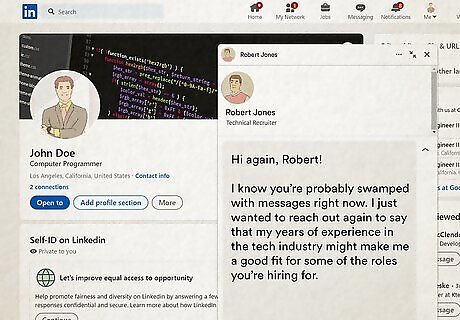
Send another message if you don’t hear back after a few days. While you don’t want to spam a recruiter with messages all at once, it’s okay to reach out again if you don’t hear a reply. Send a second message after a couple of business days just to reach out again and bump your message to the top of their inbox. “Hi again, Robert! I know you’re probably swamped with messages right now. I just wanted to reach out again to say that my years of experience in the tech industry might make me a good fit for some of the roles you’re hiring for.”
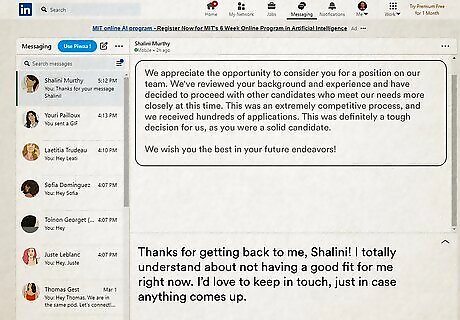
Nurture the relationship after you get a response. Even if the recruiter doesn’t have a job for you right now, it’s always good to keep that connection strong. Thank them for replying, then ask them to keep you in mind if anything comes up. “Thanks for getting back to me, Jennifer! I totally understand about not having a good fit for me right now. I’d love to keep in touch, just in case anything comes up.”
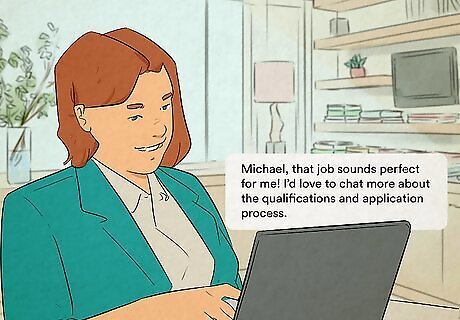
Reply with your interest (or disinterest) about potential jobs. If a recruiter does have something for you, that’s great! Tell them quickly whether or not you think it might be a good fit so that they can move you forward into the application process (or look for other jobs for you). “Michael, that job sounds perfect for me! I’d love to chat more about the qualifications and application process.” “Thanks for getting back to me, Nicole. Unfortunately, that job doesn’t sound like the right fit for me at this time, but I appreciate you reaching out.”
Sprucing Up Your LinkedIn Profile
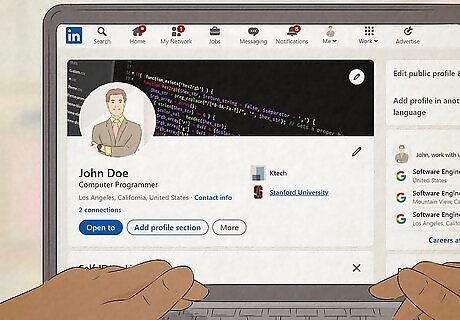
Update your LinkedIn with your most relevant information. To get a better chance for a reply, check out your own LinkedIn profile first. Do you have a cover photo, a profile picture, and a summary? Is your profile up to date with your most recent education and work history? If not, spend a few moments updating your LinkedIn so it looks professional. LinkedIn allows you to be a little more free than a resume or CV. Feel free to talk about your soft skills and who you are as a person outside of work, too.
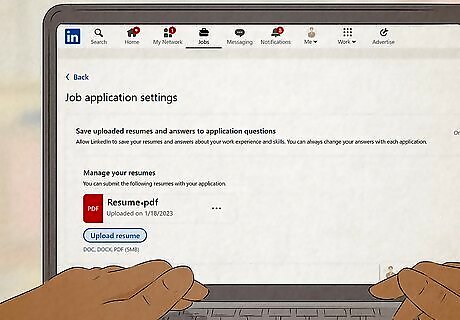
Add a CV or resume in PDF form. To save your recruiter a step, attach your resume or CV directly to your LinkedIn profile. Under “Settings,” go to “Data privacy” > “Job application settings” > “Upload Resume.” Be sure to update your resume to the latest version, then attach it to your profile.



















Comments
0 comment